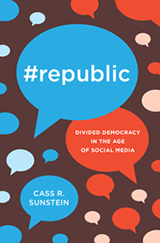This is an insight written by Esther Kaufman on a lecture given by Professor Cass Sunstein, at the American Enterprise Institute on April 14th 2017. Professor Sunstein is a scholar of law and behavioral economics, and he spoke about his new book #Republic: Divided Democracy in the Age of Social Media.
Social Media and Political Fragmentation
Social media has undoubtedly helped to shape a more interconnected world. However, Sunstein’s research illuminates the role it may have in exacerbating political fragmentation.
Reinforced Confidence and the Rise of Radical Views
In hopes of better understanding how people’s interactions with one another can alter political views, Sunstein conducted a study with two groups; one group was moderately liberal and another was moderately conservative. After confirming their views he asked them to deliberate on commonly polarized issues such as affirmative action, climate change, and gay rights. In comparing the private beliefs of individuals, pre-deliberation and post-deliberation, Sunstein attempted to stimulate the impact of social media. Sunstein found that post-deliberation individuals from both groups became more confident and, worse, more extreme in their views. In other words, the moderate beliefs of most participants prior to deliberation turned into stark convictions.
Architecture of Control
Social Media platforms like Facebook and their advertisers consciously manipulate a logarithm that controls what viewers see. Although this is intended to provide the most likeable experience to its users, this architecture of control may also be worsening extremism. Unfortunately, as social media shapes a like-minded community, it continues to reinforce common beliefs while simultaneously failing to introduce opposing perspectives to its users.
Power of Serendipity
 Ultimately, there is no easy way to diffuse the political polarization that has continued to grow in our nation. However scholars, such as Sunstein, argue that there is a need to introduce serendipity onto social media platforms to pivot users to engage in more diverse interactions. Using this approach would help engage users with different beliefs, similar to the way different cultures interact within a city.
Ultimately, there is no easy way to diffuse the political polarization that has continued to grow in our nation. However scholars, such as Sunstein, argue that there is a need to introduce serendipity onto social media platforms to pivot users to engage in more diverse interactions. Using this approach would help engage users with different beliefs, similar to the way different cultures interact within a city.
Diversity as part of American Identity
Diversity has been America’s most critical building block that continues to stimulate the competition of ideas, support national freedom and propagate the nations growth. For this reason, it is important to explore channels through which it can be sustained. This is especially pertinent to college campuses that may too easily act as homogeneous bubbles, unconsciously stifling opposing ideologies. On college campuses this is to recognize suppressed conservative thought that commonly exists as a minority. In proactively generating discussion of different ideologies, both conservative and liberal, members of a campus community would allow themselves to better understand the roots of beliefs. The ideal is that such knowledge would spur more innovative thinking and preserve a diversity that has sustained the American identity for centuries.
About the Author:
 Esther Kaufman is an undergraduate student studying Economics at the University of Maryland with a minor in Global Terrorism Studies. She is interested in the effects of economic policy on issues such as equality, welfare and radicalization of individuals in society.
Esther Kaufman is an undergraduate student studying Economics at the University of Maryland with a minor in Global Terrorism Studies. She is interested in the effects of economic policy on issues such as equality, welfare and radicalization of individuals in society.
Photo Credit : BrickinNick Flickr via Compfight

